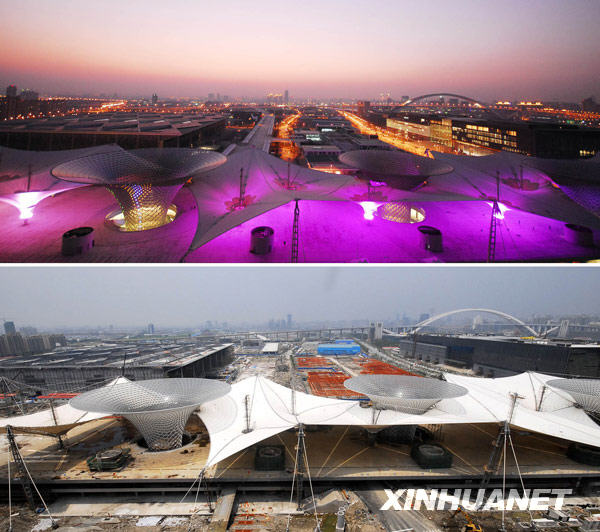China opens Shanghai Expo

Friday, April 30, 2010; 4:12 PM
SHANGHAI -- With a frenzy of fireworks over a metropolis that once symbolized China's subjugation by the West, China on Friday launched its first world's fair, a jamboree of 189 nations that Communist Party leaders hope will showcase their country as a potent but peaceful world power.
As the Chinese character for peace flashed on a giant screen and Beethoven's "Ode to Joy" boomed from loudspeakers, a flotilla of boats carried the flags of the participating nations down the Huangpu River, a waterway that in the colonial era brought foreign invaders and traders, Western ways and also great wealth to China's most cosmopolitan city.
After eight years of preparation, more than $50 billion in state funds and the biggest security operation in China since the 2008 Olympic Games in Beijing, President Hu Jintao, who is also head of the Communist Party, declared Expo 2010 Shanghai open at a ceremony held in a riverfront hall shaped like a flying saucer.
The ceremony, a mix of Sino-Western schmaltz and stiff Chinese ritual, featured the Chinese national anthem, a song by Hong Kong movie star Jackie Chan, a rendition of Puccini's "Nessun Dorma" by Italian pop tenor Andrea Bocelli and meticulously choreographed mass dance routines. Balloons rose from the stage to form the shape of a dove.
Police closed off streets in wide swaths of the city ahead of the event, which was attended by numerous foreign dignitaries, including North Korea's No. 2 and French President Nicolas Sarkozy and his wife, Carla Bruni. The United States, which has hosted more world's fairs than any other nation but now generally sees such gatherings as passe, did not send a high-level government representative.
Human Rights Watch, in a statement issued in Washington, said Shanghai authorities had raided the homes of prominent government critics, confiscated computers and denied Expo media accreditation to a Hong Kong newspaper, Apple Daily, which has frequently annoyed Beijing with its irreverent reporting.
Speaking for the party leadership at the evening gala, Wang Qishan, a member of the Politburo, said the Shanghai Expo, which opens to the public Saturday and runs for six months, would "open the great door to the future" and trumpeted a "more open and tolerant China" as a force for international harmony. Seventy million people are expected to visit the fair.
Jean-Pierre Lafon, president of the International Exhibitions Bureau, a Paris-based bureaucracy that supervises world's fairs, said the Shanghai Expo "illustrated the emergence of China in the 21st century." He drew snickers from the mostly Chinese audience with a speech that mixed fluent French, heavily accented English and barely intelligible Chinese.
In the West, world's fairs no longer generate much excitement. But China, a latecomer to the club, has zealously embraced a tradition, rooted in both nationalism and internationalism, that dates to the mid-19th century.
Tens of thousands of Shanghai residents watched the firework and laser light show Friday evening from the Bund, a riverside embankment studded with grand colonnaded buildings dating from Shanghai's pre-communist era, when the city served as Asia's financial capital, a role it now wants to reclaim.
"In the past, foreigners looked down on Chinese. I am now very proud and excited," said Jiang Xian, a retired a petrochemical worker who had brought his wife and granddaughter to watch the spectacular pyrotechnics.
Even newcomers to Shanghai, who often complain that the locals are unfriendly and arrogant, gloried in the city's moment in the sun. "I am not a Shanghainese, butt I still feel happy to see Shanghai become the center of the country and maybe the world," said Li Changbing, another spectator on the Bund.
如有疑問?請告知!定當刪除 並致上最深的歉意




 留言列表
留言列表
 【蔡英文說想想】:【中華民國國家作戰系統安全藍圖】
【蔡英文說想想】:【中華民國國家作戰系統安全藍圖】 
